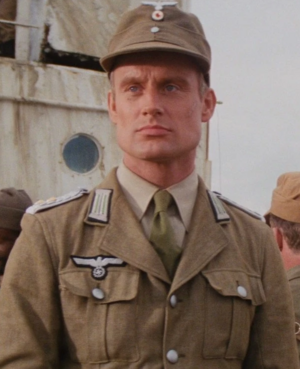Ulrich Dietrich von Braun
Ulrich Dietrich von Braun | |
|---|---|
 | |
| Birth name | Ulrich Theodor Dietrich Caspar von Braun |
| Other name(s) | U.D. von Braun |
| Born | 13 February 1891 Freibach, Zweilingen Province, Autocratic East Europan Imperial Alliance |
| Died | 21 September 1995 (aged 104) Leipförde, Margraviate of Lustenben, Autocratic East Europan Imperial Alliance |
| Allegiance | |
| Branch | |
| Years of service | 1921 – 1945 |
| Rank | |
| Unit | |
| Battles/wars | |
| Relations |
|
Ulrich Theodor Dietrich Caspar von Braun (13 February 1891 – 21 September 1995), known shorthandedly as Ulrich Dietrich von Braun and U.D. von Braun, was an East Europan general officer who commanded the 71st Light Infantry Division, a constituent military formation of the Seleucia Korps.
Ulrich was born in 13 February 1891 to a middle-class family who owned a small business in Freibach. He is described as a stern, diligent, and hardworking individual who ensued the vitality of the business. However, he was eager to become an officer in the Reichsarmee, and graduated from the Steinhäusser Imperial War College as a Lieutenant. His first posting was in the 212th Infantry Regiment of the Imperial East Europan Hindalesian Legion, where he fought in West Zanarkand during the First Europan War under the command of Archelaus zu Schärtal-Tangersten. After the war, he served with an East Europan advisory group to Secadia during the Ygacuá War, and subsequently in the general staff of the Estharian Expeditionary Corps. During the Second Europan War, he was promoted to General der Infanterie and was given command of the 71st Light Infantry Division in the Seleucia Korps, and was placed under orders of Alexander Sundermann. He took exceptional notice of the Peltast Battalion, and utilized them in special missions whenever opportunity came. He would continue to fight with the Korps until their surrender in the events after the Battle of Kontin. He somtimes came into conflicts with Sundermann regarding strategic decisions, most notably in the Battle of Amestria where Sundermann decided to hold off breakthrough attacks against Allied forces, which would loosen further pressure with high risk.
Ulrich is known as a staunch upholder of the Maximilianist cause, and held prejudices against the Darscens, although he has abandoned these views in his later life. His experiences were jotted down by Sundermann and Florian Güldenstädt, his former subordinate, in the latter two's memoir The Long Retreat: From Mesopotamia to Quenmin, which was adapted in the 2000 eponymous film.